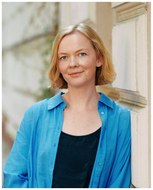Claudia Roswandowitz
 © Stefan Fischer
© Stefan Fischer
wissenschaftliche Mitarbeiterin & Projektleiterin
NameDr. rer. nat. Claudia Roswandowitz
Eine verschlüsselte E-Mail über das SecureMail-Portal versenden (nur für TUD-externe Personen).
| 2025 – now |
Postdoctoral researcher & PI, Faculty of Psychology, Cognitive and Clinical Neuroscience Lab, TU Dresden, Dresden, Germany, DFG-funded position |
| 2021–2024 |
Postdoctoral researcher & PI, Department of Computational Linguistics, Phonetics and Speech Sciences Lab, University of Zurich, Zurich, Switzerland, UZH-postdoc grant |
| 2019–2021 |
Postdoctoral researcher, Department of Psychology, Cognitive and Affective Neuroscience Unit, University of Zurich, Zurich, Switzerland |
| 2018–2018 | Project management (non-academic position), University Clinic for Psychiatry, Psychotherapy and Psychosomatic, German Academy for Suicide Prevention e.V., Halle (Saale), Germany |
| 2017–2018 | Postdoctoral researcher, Faculty of Psychology, Cognitive and Clinical Neuroscience Lab, Dresden University of Technology, Dresden, Germany |
| 2016–2016 | Visiting researcher, BRAMS - International Laboratory for Brain, Music and Sound Research, Université de Montréal/McGill University, Montreal, Canada, Erasmus Mundus Exchange Network grant |
| 2012-2017 | Pre-doctoral researcher, International Max Planck Research School on Neuroscience of Communication (IMPRS), Neural Mechanisms of Human Communication Lab, Max Planck Institute for Human Cognitive and Brain Sciences, Leipzig, Germany |
- Social interactions with artifical voices
- Voice-identity processing
- Mental voice representations
- Phonagnosia
Roswandowitz C, Kathiresan T, Pellegrino E, Dellwo V, Frühholz S (2024) Cortical-striatal brain network distinguishes deepfake from real speaker identity. Commun Biol 7:711. https://doi.org/10.1038/s42003-024-06372-6
Roswandowitz C, Swanborough H, Frühholz S (2021) Categorizing human vocal signals depends on an integrated auditory‐frontal cortical network. Hum Brain Mapp 42:1503–1517. https://doi.org/10.1002/hbm.25309
Roswandowitz C, Maguinness C, von Kriegstein K (2019) Deficits in voice-identity processing: Acquired and developmental phonagnosia. In: The Oxford Handbook of Voice Perception (Frühholz S, Belin P, ed).
Maguinness C, Roswandowitz C, von Kriegstein K (2018) Understanding the mechanisms of familiar voice-identity recognition in the human brain. Neuropsychologia 116:179–193. https://doi.org/10.1016/j.neuropsychologia.2018.03.039.
Roswandowitz C, Kappes C, Obrig H, von Kriegstein K (2017) Obligatory and facultative brain regions for voice-identity recognition. BRAIN, 141(1), 234 - 247. https://doi.org/10.1093/brain/awx313
Roswandowitz C, Schelinski S, von Kriegstein K (2017) Developmental phonagnosia: Linking neural mechanisms with the behavioural phenotype. Neuroimage 155. https://doi.org/10.1016/j.neuroimage.2017.02.064
Roswandowitz C, Mathias SR, Hintz F, Kreitewolf J, Schelinski S, von Kriegstein K (2014) Two Cases of Selective Developmental Voice-Recognition Impairments. Current Biology 24:2348–2353. https://doi.org/10.1016/j.cub.2014.08.048
3sat Unsere Stimme – So einzigartig, so manipulierbar!. Scientific documentary (2025) https://www.3sat.de/wissen/wissenschaftsdoku/250508-sendung-unsere-stimme-einzigartig-und-manipulierbar-gerade-in-zeiten-von-ki-wido-100.html
KI - Wir müssen sprechen, Podcast interview partner (2024) https://www.wirmuessensprechen.de/e/nuancen-der-stimme-sind-sehr-schwer-zu-kopieren-claudia-roswandowitz/
Tagesschau, KI-Stimmen können Menschen (noch nicht) täuschen. Press article (2024) https://www.tagesschau.de/wissen/studie-audio-deepfakes-100.html
Museum für Gestaltung Zürich, Planet Digital. Listen Up! Installation on digital communication (2022) https://www.planetdigital.ch/de/impressum
Spiegel, Hä? Wer spricht da bitte? Press article (2016) https://www.spiegel.de/wissenschaft/hoer-mal-wer-da-spricht-a-c905b0f9-0002-0001-0000-000148565038
Frankfurter Allgemeine Zeitung, Für manche Menschen klingen alle Stimmen gleich. Press article (2015) https://www.faz.net/aktuell/stil/leib-seele/fuer-manche-menschen-klingen-alle-stimmen-gleich-13720523.html
- Seminar on neurodevelopmental disorders
